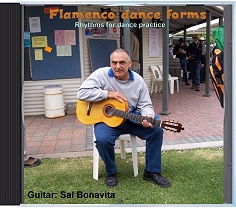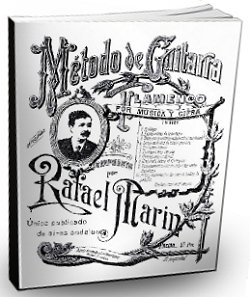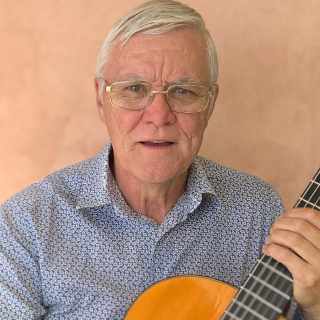
Manitas De PlataFlamenco Guitarist, or Not?Why is he not mentioned on websites about Flamenco? Or for that matter, in books about flamenco or in online flamenco CD stores. Good question.Manitas de Plata is an amazing improviser.
He sold millions of records in the 1960s and 70s and entertained sellout crowds around the world. In 1964, Pablo Picasso is said to have exclaimed after seeing him perform, "That man is of greater worth than I am!" and proceeded to draw on the man's guitar. I dare say this worn out guitar is now worth a small fortune. In 1968, he performed in the presence of the Queen at the London Palladium. He also represented Europe at the United Nations annual gala celebrating the International Declaration of the Rights of Man. Not bad for an illiterate man who was born in a gypsy caravan and couldn't read music to save his life. However, Manitas de Plata has a greater legacy than the records he left behind as a testimony to his talent. In his own way, he helped to lay the foundations for the Gipsy Kings, who were formed by the sons of Jose Reyes (his vocalist) and other members of the Baliardo family. Notably Tonino Baliardo, one of my favorite guitarists is Manitas de Plata's son.
So why does he not command the respect he deserves among flamenco aficionados? There are a couple of reasons for this which may not be immediately obvious to anyone not familiar with traditional flamenco.
Firstly, he is a French gypsy. This in itself (being a non-Spaniard) should not, and does not necessarily exclude an artist from being described as a flamenco artist by fellow flamencos from Spain.
The main reason he is not mentioned is because he is rather loose with his compás. Basically, compás is a recurring cycle of beats analogous to a bar of music. In flamenco rhythms, the beat cycle may be 2, 4, 6, 8 or 12 beats, depending on the rhythmic form. To traditional flamenco artists from Spain and aficionados alike, not adhering strictly to compás is equivalent of blasphemy. While Paco de Lucia's guitar playing could be described as extremely fine and full of creative insight, Manitas de Plata's playing is as raw as you can get.
Loose cannon creativity Vs Tradition rules His music also lacks cohesion, meaning that there is no apparent structure to a lot of his music. It's more like a random collection of musical ideas created on the fly and without reference to the bits before and after. In other words, little or no coherent musical "flow".
Basically he makes things up on the spot and slows down and speeds up too much when one would expect a steady rhythmic tempo. While this may be OK to the record buying public, it is not OK to someone who knows flamenco. There are certain dynamic and structural "rules" with most traditional flamenco forms that all performers in a group would be aware of and adhere to, including parts that actually DO speed up and slow down. Otherwise a performance would descend into chaos.
In a nutshell, his music cannot be followed by a dancer or by another guitarist because he appears to be in his own world and plays primarily for himself. Much As I enjoy the energy and spontaneity of manitas de Plata's recordings, I must confess that I can't follow it. All you have to do is start counting the 12 beats in one of his Soleares, and before you get very far into the piece, he has made one compás 8 beats and another 10 beats and yet another 14 beats.
No serious flamenco student could use his falsetas (musical variations) verbatim. Interesting as they may be, they require major modification before they could be used to accompany a dancer for example. He is not a composer or a musical "choreographer" in the same way as Paco de Lucia or Sabicas would be. It's more like an instant "crazy fingers" maker of random music that sounds like flamenco and has flamenco titles attached to it, but is not flamenco.
Criticism has no affect on popularity or fame This is not to say that he is not an inspiring performer and guitarist. By saying these things, I am not knocking him or trying to put his down as an artist. I am simply repeating the usual criticism in explaining why he is not so well regarded as a guitarist in Andalucia, the heartland of traditional flamenco. I'm sure he was well aware of this sort of criticism but I am equally sure he couldn't give a two hoots.
In a way, the amazing success of the Gipsy Kings is a testament to his raw, "go for it" style. Even his harshest critics would have a hard time denying the fact that Manitas de Plata was one of the big internationally recognized flamenco names in the 60's and 70's who were instrumental in exposing the art of flamenco to the world at large, and more importantly, to the mainstream record buying public. |
|

Download my CD
Flamenco Dance Forms

Flamenco guitar method 1902


